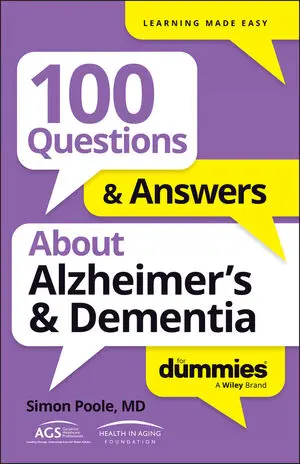You can reinforce someone's sense of reality by
- Displaying on a board the day, date, time of next meal, and even weather. You must remember to change it every day!
- Mounting large wall clocks in each room
- Buying daily newspapers (and putting old ones in the recycling bin)
- Putting picture signs on each door to identify the purpose of each room
- Making sure that everyone wears name badges, if the person is in a nursing home
- Actively discussing current events, frequently using the person's name in conversation, and referring to the day of the week as often as possible
Noting the risks and benefits
Research has shown that reality orientation can produce positive results, particularly when used alongside dementia medication. For example, a 2005 study showed improvement in memory and other cognitive test scores in participants experiencing reality orientation therapy over a 25-week period compared to those receiving pills only. And other studies have found that reality orientation also has a positive effect on people's ability to socially interact with others.Unfortunately, the research has only been conducted with small numbers of people, meaning that definitive conclusions can't be drawn. However, a review by the Cochrane Library in 2003 suggested that sufficient positive evidence supports reality orientation therapy to encourage people to try it.
Recognizing criticisms to reality orientation
Despite the positive results that reality orientation produces, critics have suggested that repeatedly correcting a person with dementia — in terms of where she is or what day it is, for example — may actually make her worse.And taking the therapy to its extreme may mean repeatedly causing the person emotional upset. For example, a person may say she wants to go home to her husband, but is repeatedly told she can't because he died four years ago. Hearing that your spouse or parent has died when you'd forgotten about it may lead to a fresh outpouring of emotion each and every time.
On a simpler level, you can easily see how being corrected about things all the time could get on your nerves and make you very irritable.
As a result of these objections to reality orientation, a few other techniques have been developed in its place:
- Validation therapy: Rather than reinforcing factual information when dealing with distress in dementia, this therapy focuses on the emotional effects of such information. Thus, for example, if the person becomes distressed while waiting for her father to pick her up at the nursing home every day, rather than saying he's long dead, the caregiver's response is to say he's running late and then to provide an activity to distract the person from her worries. Although this treatment can help, insufficient evidence exists for it to be recommended as a treatment for all.
- Specialized Early Care for Alzheimer's (SPECAL): Penny Garner developed this treatment while looking after her mother, who had dementia. She has since set up the Contented Dementia Trust in the United Kingdom in order to share the therapy with others. SPECAL therapy has three main rules aimed at preventing people from becoming distressed by questions their memories won't help them answer:
- Don't ask questions.
- Listen to the experts — the people with dementia — and learn from them.
- Don't contradict.
Although this method no doubt reduces distress for people with dementia — and their caregivers — critics suggest that it disempowers people with early dementia. Not being told the truth in a particular situation means people can't be involved in decision making, something that advocates of people with dementia, such as the Alzheimer's Association, believe is very important.
Whatever the rights and wrongs of these therapies, there's no doubt that they can benefit a number of people and their caregivers. Recognizing that everyone's different, regardless of illness and disability, means that trying some or all of these methods and seeing which, if any, are right for the person being cared for is a reasonable approach.





